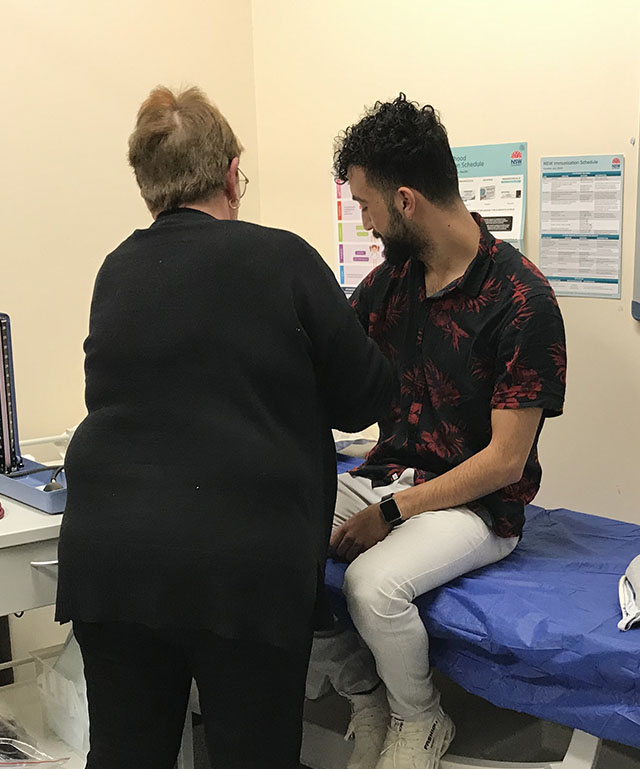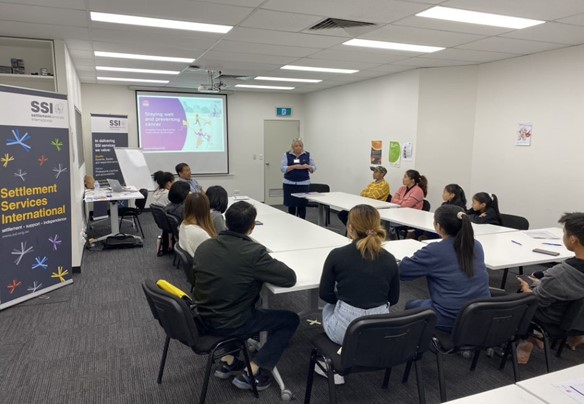The health and wellbeing of people from refugee backgrounds can be different from the general population. Their experiences before and after settlement may involve psychological and physical health challenges due to exposure to torture and conflict.
People from refugee backgrounds may have come from countries with limited healthcare and poor resources, including access to clean water and sanitation. They may have poor health, including undiagnosed or poorly treated health conditions.
After arriving in Australia, refugees face additional barriers to healthcare, such as:
- competing priorities in the settlement process (for example, housing, employment, education and health)
- increased stress
- low literacy levels
- difficulty understanding and navigating the healthcare system.
Recognising these unique needs will support the effective and efficient delivery of healthcare to people from refugee backgrounds.
Common health issues
| Health issue | Recommended resources |
|---|---|
Diet
| Source: Victorian Refugee Health Network Source: Australian Refugee Health Practice Guide |
Chronic conditions
| Hepatitis B fact sheet for primary care providers Source: Victorian Refugee Health Network Hearing, vision and oral health Source: Australian Refugee Health Practice Guide |
Other conditions
| Oral health - Immigrant Health Service Source: The Royal Children's Hospital, Melbourne Management of psychological effects of torture or other traumatic events Source: Australian Refugee Health Practice Guide Transcultural Mental Health Centre Source: NSW Health NSW education program on female genital mutilation Source: Western Sydney Local Health District |
For a more comprehensive list of common health concerns that people from refugee backgrounds may experience, refer to the Australian Refugee Health Practice Guide.
Health literacy

People from refugee backgrounds may arrive to Australia with very low levels of health literacy. They may not understand local health services and how to navigate the healthcare system. This can limit a person's ability to make health decisions.
Below are some examples that highlight the impact low health literacy can have on people:
- A young woman seeking care in the late stages of her pregnancy did not know she was pregnant and had no understanding of antenatal care.
- A young man experiencing back pain did not know he had kidney issues or what a kidney is.
- People only seeking health support for emergencies; and not understanding health prevention.
- A child being given adult doses of medication because the parent did not know there was a different dosage for children.
- A young woman refused to drink water while she was breast feeding because she feared it may harm her baby.
- People being referred to attend radiology, pathology or specialist appointments but not attending because they didn’t understand the process, the importance of the appointment or how to attend the appointment.
Health education
Targeted education sessions, health promotion programs and resources, and interaction with bicultural health workers will help improve health literacy among the community.

Resources
NSW Health Literacy Framework: A guide to action
Source: Clinical Excellence Commission
Consumer enablement guide – covers communication, health literacy, culturally responsive practice and working with culturally and linguistically diverse groups
Source: Agency for Clinical Innovation
Health literacy publications – for health professionals and consumers
Source: Multicultural Health Communication Services
Health literacy: taking action to improve safety and quality
Source: Australian Commission on Safety and Quality in Healthcare
Trauma-informed care
Using a trauma-informed approach to healthcare means that you recognise and understand the ways that trauma affects people, while emphasising safety and minimising re-traumatisation in service delivery. This is particularly important when caring for people from refugee backgrounds.
If a refugee has experienced traumatic events or been persecuted, they may feel anxious about using state and government services. Refugee health and support services need to enable people to feel safe and welcome.
Resources
Trauma-informed care framework
Source: Agency for Clinical Innovation
Approach to consultation and management – considering the impact of past trauma on consultation when caring for people from refugee backgrounds.
Source: Australian Refugee Health Guide
Trauma-informed care and practice – a graduate course for NSW Health staff from the Health Education and Training Institute (HETI)
Source: HETI Higher Education
Resources
Prescribing tips – improving understanding of how, why, and when to take the prescribed medication
Source: Australian Refugee Health Guide
Prescribing for refugees – article in Australian Prescriber
Source: NPS Medicinewise
Refugee and migrant health – fact sheets, publications and news from an international perspective
Source: World Health Organization
Common health needs of refugees and migrants – literature review
Source: World Health Organization